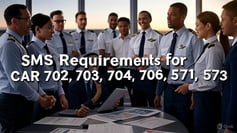Under CAR 702, 703, 704, 706, 571, and 573??

In Canada, the requirement for a formal Safety Management System (SMS) under the Canadian Aviation Regulations (CARs) applies to specific categories of air operators and organizations, as outlined in CAR 107 and related subparts.
Based on the regulations and their applicability to CAR 702, 703, 704, 706, 571, and 573, here’s which of these require a formal SMS as of year 2025:
Overview of SMS Requirements
- A Safety Management System is a systematic approach to managing safety, including organizational structures, accountabilities, policies, and procedures to identify and mitigate risks.
- CAR 107 prescribes SMS requirements, with applicability depending on the type of operation or organization (e.g., commercial air operators, maintenance organizations).
- SMS requirements are detailed in CAR 107.02 (applicability) and 107.03 (components of an SMS, such as safety policy, hazard identification, and safety reporting).
SMS Requirements for CAR 702, 703, 704, 706, 571, and 573
- CAR 702: Aerial Work
- SMS Required? Yes, for most operators.
- Details:
- Under CAR 107.02, holders of an Air Operator Certificate (AOC) issued under CAR 702 must implement an SMS unless exempted.
- Exemption: Small aerial work operators with one pilot (owner-operator) and one aircraft used solely for aerial application or external load operations are exempt (per CAR 107.01(2)).
- Non-exempt operators must comply with CAR 107.03, establishing a formal SMS with components like safety oversight, risk management, and safety performance measurement.
- Implementation: Operators must integrate SMS into operations, with Transport Canada providing guidance via Advisory Circular AC 107-001.
- CAR 703: Air Taxi Operations
- SMS Required? Yes.
- Details:
- All holders of an AOC under CAR 703 are required to have a formal SMS, as per CAR 107.02.
- No exemptions apply, given the commercial nature of air taxi operations, which often involve passenger transport to remote areas.
- The SMS must include proactive hazard identification, safety reporting systems, and training for personnel, as outlined in CAR 107.03.
- Implementation: Compliance is mandatory, with Transport Canada oversight to ensure SMS effectiveness, especially for operators serving remote communities.
- CAR 704: Commuter Operations
- SMS Required? Yes.
- Details:
- Like CAR 703, all CAR 704 AOC holders must implement a formal SMS under CAR 107.02.
- This applies due to the scale of commuter operations, which involve larger aircraft and potentially scheduled services.
- The SMS must address safety risks associated with operations, including crew training, maintenance, and passenger safety, per CAR 107.03.
- Implementation: Operators must maintain a robust SMS, with regular audits and safety performance reviews.
- CAR 706: Aircraft Maintenance Requirements for Air Operators
- SMS Required? No, as a standalone requirement.
- Details:
- CAR 706 governs maintenance requirements for air operators under CAR 702, 703, 704, and 705 but does not directly mandate an SMS.
- However, if an operator under CAR 702, 703, or 704 also manages maintenance under CAR 706, their SMS (required by their AOC) must incorporate maintenance-related safety processes (e.g., quality assurance, hazard reporting).
- The SMS obligation stems from the operator’s AOC (under CAR 107.02), not CAR 706 itself.
- CAR 571: Maintenance
- SMS Required? No.
- Details:
- CAR 571 applies broadly to maintenance of all aeronautical products, including private and commercial aircraft, and does not impose an SMS requirement.
- It focuses on technical standards for maintenance tasks (e.g., repairs, modifications) and record-keeping, not organizational safety systems.
- If maintenance is performed by an Approved Maintenance Organization (AMO) under CAR 573, SMS requirements may apply (see below).
- CAR 573: Approved Maintenance Organizations (AMO)
- SMS Required? Yes, for certain AMOs.
- Details:
- Under CAR 107.02, AMOs holding a certificate under CAR 573 that perform maintenance for CAR 705 operators (large commercial airlines, e.g., Air Canada) must have a formal SMS.
- AMOs serving only CAR 702, 703, or 704 operators are not required to have an SMS, unless they voluntarily adopt one or are contracted by a CAR 705 operator.
- For applicable AMOs, the SMS must include safety management processes specific to maintenance, such as error reporting, quality assurance, and corrective actions, per CAR 107.03.
- Implementation: Transport Canada’s Advisory Circular AC 107-002 provides guidance for AMOs on SMS integration.
How SMS Pro Addresses CAR 107 Requirements and Modules Used
Summary Table
| CAR Section | Description | Formal SMS Required? |
|---|---|---|
| 702 | Aerial Work | Yes, except for single-pilot exemptions |
| 703 | Air Taxi Operations | Yes |
| 704 | Commuter Operations | Yes |
| 706 | Aircraft Maintenance (Operators) | No (but covered by operator’s SMS) |
| 571 | Maintenance (General) | No |
| 573 | Approved Maintenance Org. | Yes, if serving CAR 705 operators |
Key Notes
- CAR 107 Compliance: Operators and AMOs required to have an SMS must comply with CAR 107.03, which outlines components like safety policy, non-punitive reporting, risk management, and safety training.
- Exemptions: The only notable exemption is for small CAR 702 operators (single pilot, specific operations). All other commercial operators under CAR 703 and 704 require an SMS.
- AMOs (CAR 573): SMS is mandatory only when supporting CAR 705 operations, reflecting the higher risk and complexity of large airline maintenance.
- Guidance: Transport Canada’s Advisory Circulars (e.g., AC 107-001, AC 107-002) and the SMS Toolkit on their website (tc.canada.ca) provide practical guidance for implementation.
- Oversight: Transport Canada conducts audits to ensure SMS compliance, with a phased approach for smaller operators (e.g., CAR 702, 703) to ease administrative burdens.
Do you need tools to manage your SMS? We're here to help. SMS Pro has been accepted by Transport Canada since 2009.





